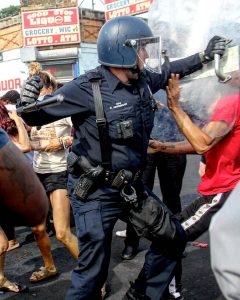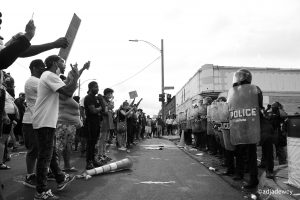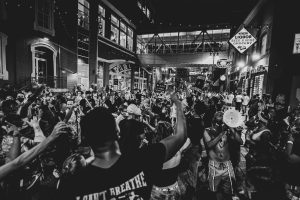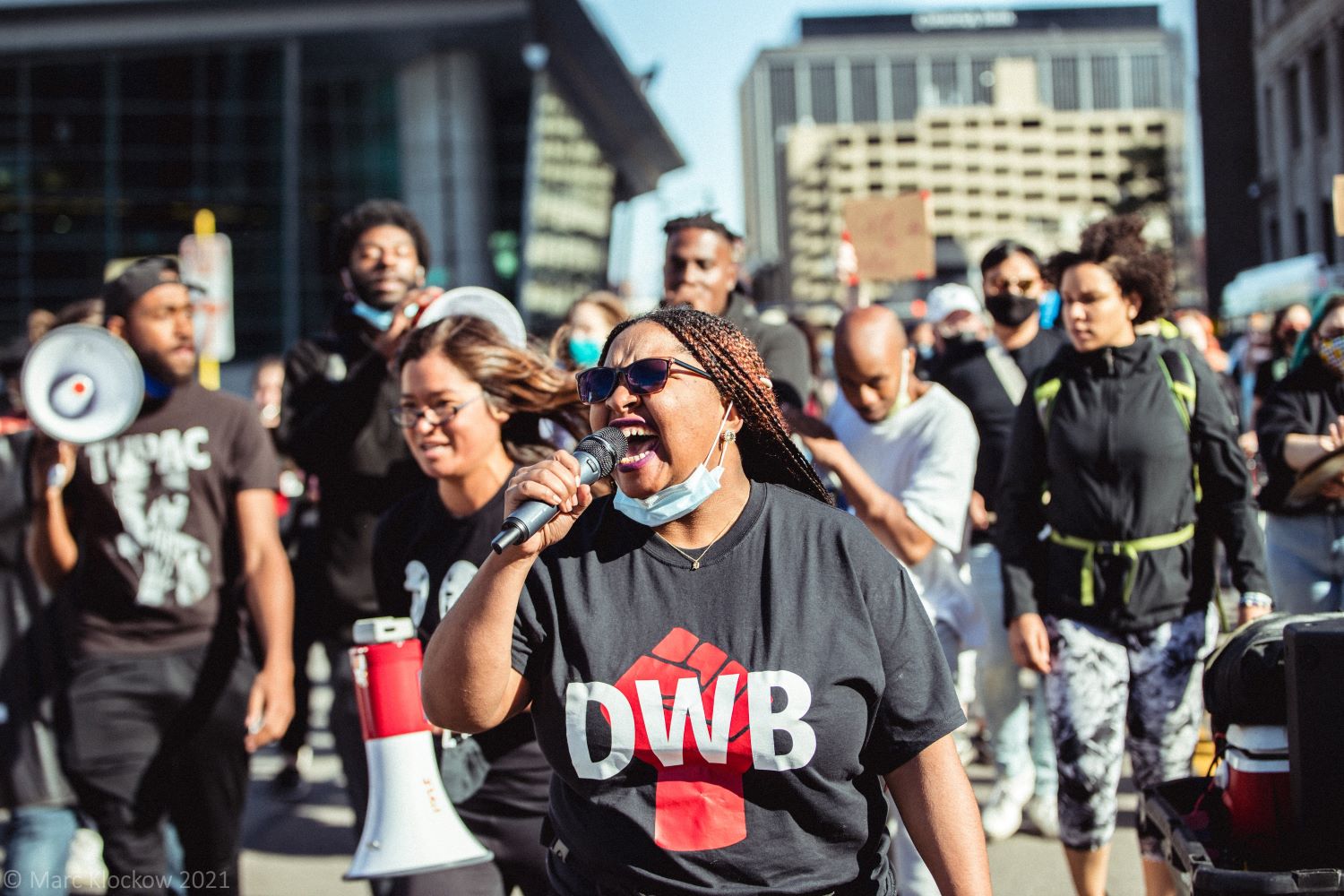The Current State of Policing
Today, May 25th, 2024 marks the four year anniversary of George Floyd’s murder and the largest uprising and social movement in the history of the United States. Since the murders of George Floyd, Breonna Taylor, and Hakim Littleton in 2020, there has been no fundamental change in how the police operate within Black, Brown, and working-class communities. In the wake of the uprisings, Democrats, including mayors, city councils, members of Congress, and President Joe Biden have promised or enacted a variety of police reforms that are allegedly to create standards of accountability for police and their behavior. Despite outrage over the last decade–uprisings that began in Ferguson in 2014 and spread across the nation in 2020–to demand accountability and an end to police killings, the number of people killed by police in Michigan and across the country has only continued to increase year over year. In 2023 alone, police officers killed over 1,200 people in the U.S., concluding as “the deadliest year by law enforcement in over a decade.” So far in 2024, police have killed 426 people in 43 states and the District of Columbia.
An investigative report on nonfatal shootings by Violet Ikonomova, published in the Detroit Free Press in April, unsurprisingly revealed that Detroit police officers regularly use excessive force when policing working class neighborhoods in Detroit. These violent encounters usually begin with instances of mere suspicion or racial profiling and the officers are rarely held accountable. Last month, in April, the Detroit Police Department (DPD) shot a 16-year-old in the back of his body as he ran away. In body camera footage released by the DPD, the teenager is seen walking with a companion at Fenkell before being targeted for what the DPD refers to as an “informational encounter,” a continuation of the racist “stop and frisk” tactic. The teen begins to run, and officers hunt him through the neighborhood before firing twice at his back. There was no warning that officers had guns drawn or that they would shoot. The police justified the shooting because the teen was armed, despite the fact that he was running away and not aiming at officers or seeking a confrontation. The cops recklessly drew guns and began shooting through a residential neighborhood with no regard for the lives of the people who live there. The department justifies the actions of its officers, the prosecutor’s office clears them of wrongdoing, and the taxpayers of Detroit foot the bill when victims rightly file suit in civil court. This is the same old story. The police do not protect us; they are the enforcement arm of capitalism and protect property, while the state protects the police to maintain their monopoly on “justifiable” violence.

Another such story happened In July of 2021, when Timothy Rives Jr. was driving through the 48205 neighborhood on Detroit’s eastside when a nondescript van aggressively followed Rives until he stopped and exited his vehicle to confront the pursuer. Without warning or identifying themselves as the DPD, the three assailants opened fire more than a dozen times, hitting Rives twice. Rives was never charged with a crime. In fact, more than a third of all victims in the cases covered in the Free Press report were also not charged with a crime.
The 48205 neighborhood is a majority Black area of Detroit with a median household income of $26,000, where 22% of residents have inadequate employment and 54% have no earnings at all. The community has been a focus of heightened policing in recent years and has experienced detrimental consequences from decades of disinvestment, emergency management, and neoliberal privatization of public resources that continue to leave the 48205, and many neighborhoods around the city, economically devastated and unstable. With rent, food, housing, and other living costs rapidly rising, residents of working-class Detroit are simultaneously denied infrastructure, health, and education investments, and instead are forced to endure the most aggressive racialized policing.

We are policed out of our neighborhoods, out of downtown, and out of the city, because Black Detroit is an inherent threat to an economic system predicated on inequality. Black Detroiters are an obstacle to the project of “revitalization,” which requires displacement of poor and working class people and prioritizes the profitability of development and capital investment above all else. Parallel to Detroit, the trends of gentrification and disinvestment, supported by over-policing, have continued to play out in cities and communities across the nation. Through a regime of violence and intimidation, the police contribute to the process of gentrification by harassing people where they live and work, pushing people out to the suburbs. Meanwhile, developers can buy land and real estate for pennies while politicians hand over more public money for police departments. The practices of the Democratic Party have led to $388 million dollars being spent this year on the Detroit Police Department — an increase of $22 million in only four years, making it the largest fiscal allocation in the city budget.
Since the municipal bankruptcy in 2012, we’ve witnessed an immense amount of resources deployed to the DPD by both Republican and Democratic politicians. In partnership with corporate elites, government officials have expanded policing by providing more money for equipment, programs, and technology including helicopters, military grade weapons, Project Green Light, facial recognition technology, ShotSpotter, and observation towers. In a campaign debate in 2020, Biden stated, “The answer is not to defund the police. It’s to fund the police. Fund them. Fund them. Fund them with resources and training.” Making good on that promise, Democratic Mayor Mike Duggan earmarked somewhere between $50-$85 million of public American Rescue Plan Act (ARPA) funding for the police and police-related programs at a time when Detroiters were reeling from the physical and financial effects of COVID-19, a housing and eviction crisis, and massive inflation. A sophisticated and interconnected network of private and police security systems, partly financed by local billionaire Dan Gilbert, has ensured that there is virtually no public space in downtown Detroit where a civilian is not being monitored. As evident in the recent harassment and bullying of Latino and other attendees of the 2024 Cinco de Mayo festival in Southwest Detroit, police are more frequently cracking down on spaces where the community gathers for leisure and celebrations. All these investments and tactics serve the strategy of intimidating and pacifying the perceived threat of working class, Black, and Brown people in the city.

The DPD, along with police departments across the nation, are struggling to find new recruits and meet their force expansion goals, and since 2020 have launched elaborate social media propaganda campaigns and community engagement schemes with the intent of drawing in new officers and winning the hearts and minds of the same people they routinely target, brutalize, and siphon resources from. Performative gestures such as police-funded block parties, summer camps, and public expressions of solidarity with events such as Black History or Pride Month serve as charades to co-opt the community and tamp down the scrutiny their departments have had to face following brutal repression against protestors exercising free speech and the ongoing oppression of Black, Brown, and working class people. Essentially, these acts are part of an overall strategy that attempts to portray a new, reformed institution through 21st century “community policing” centered around public safety. However, they are little more than superficial and patronizing tactics of gently patting our heads while continuing to keep a knee pressed against our necks.
An additional key finding of the aforementioned Free Press report details the frequent disappearance of body camera footage. It notes that even the Detroit Board of Police Commissioners, often criticized for a lack of independence from the DPD, called missing body camera footage an “epidemic.” The disappearance of body camera footage clearly demonstrates the lack of transparency and accountability on the part of the DPD, and while this is problematic, we also know that bodycam requirements, a basic reform that has been widely adopted, are used as a tool to temper outrage and do nothing to curb police violence. When video was available, the Free Press report found it did not make much of a difference in the punishment of officers. Since Rodney King was beaten in 1991 we’ve seen countless videos of violent encounters with police, yet the institution of policing remains unchanged. Derek Chauvin murdered George Floyd on camera and yet it was only after a global uprising that the state sacrificed one of its foot soldiers to extinguish the militancy of the movement. Meanwhile, the cop who killed Breonna Taylor simply got a new job. Police enjoy a multitude of protections that make it nearly impossible to hold them accountable in a legal system designed to protect the interests of the wealthy. Occasionally, after long fights, a department or individual may face limited consequences, but a focus on individual officers only serves to soften the outrage of the public while skirting any structural changes to the nature of policing itself.
What Are Our “Leaders” Saying About This?
Joe Biden and the Democratic Party of today are just as committed to racist oppression and exploitation as the Democratic Party that wrote and sponsored the Welfare Reform Act of 1996 and the Violent Crime Control and Law Enforcement Act of 1994, commonly known as “the crime bill,” which led to the mass incarceration of Black people. Likewise, the Biden administration’s commitment to a genocidal Israeli occupation of Palestine, mass incarceration, and militarized policing is evidence that the party cannot be reformed.
The lack of response from Black community leaders regarding the Free Press report is especially disturbing, considering organizations that claim to represent and speak for the Black community and purport to prioritize public safety and empowerment, have yet to utter a word of protest against the police or the elected officials who unwaveringly support them. The financial, social, and political links between these organizations and the City certainly motivates their silence, though it is likely not the key reason. The main reason is the reformist politics these groups practice. They adhere to the same politics of the Democratic Party, who essentially serve the same interests as the Republican Party, all of which represent the wealthy and have no real intention of drastically improving the material conditions of Black folks and the working class. Their vision of Black liberation is rooted in the idea of the middle class and the attainment of wealth and refuses to question the role of the police and prisons in society. They are willing to accept and legitimize the “necessity” of an institution birthed on the basis of anti-Blackness.
Former Police Chief James Craig’s “law and order” and conservative “tough on crime” attitude allowed the DPD’s violence and brutality on Black Detroit to reign unchecked for nearly a decade. His resignation in 2021 was a testament to the strength of the movement in defense of Black and Brown life. Because of the critiques brought forward by the movement, the city felt pressure to bring in a new chief, James White, who appears on the surface to be more community-oriented. As a licensed counselor and former head of the Michigan Department of Civil Rights, he is seemingly more interested in community relations than violent policing. But it would be a mistake to take James White at his word and see him as a leader — especially when his department is still shooting Black kids as they run away, still stopping and frisking, still brutalizing protestors, still targeting Black spaces, and still policing Black life. Many aspects of his seemingly “level-headed” leadership are concessions made to the movement, from his policy of releasing body camera footage of officer involved shootings within 45 days, to the creation of The Crisis Intervention Team program, both of which have failed to produce less police shootings or instances of police violence. They are not proof of his transparency, but of the mayor’s need to assert damage control and establish a new facade of a reformed department at the leadership of a “good cop.” These policies are in the end, the bare minimal expression of the movement’s power.
These organizations, officials, and self-appointed leaders of Black Detroit and similar communities are in a fatal marriage with the Democratic Party–one that positions them on the wrong side of history. They are unable and unwilling to break from the Biden administration, which means they have been silent on the police repression faced on campuses and in cities across the nation. They have been silent on the increase in police murders, and in doing so they are complicit with the oppression caused to Black people in the US and Palestinians in Palestine. This allows them to shelter themselves from scrutiny and ensure the maintenance of their own self interests. Silence from these groups allows these abuses to continue, and therefore necessitates the development of new, radical leadership of the Black community–leadership that is prepared to fight consistently for the interests of working-class Black Detroit and all oppressed people.
From Everyday Violence to Political Repression, the Police are on the Frontlines of Injustice
Over the last seven months, a movement against the genocide in Palestine has exploded in the streets and on university campuses. As people across the nation have stood up in support of Palestine, the state has violently cracked down on the dissenting voices who oppose the genocidal occupation of Palestine. Who have politicians and university administrations sent to quell the free speech and militancy of these students and professors? The police. As shown throughout history, the police are always the enforcers used to suppress movements. Whether it is in the mass struggle for Palestine or the everyday lives of working people, the police are the violent instrument of state repression.
The link between policing in America and the Zionist occupation of Palestine is not only symbolic, but material. The U.S. has spent billions of tax dollars extracted from the working class to arm and support the occupation of Palestine while people in our communities struggle to afford basic necessities. Communities like the 48205 where the DPD gunned down Timothy Rives. Domestic law enforcement trains and exchanges tactics of urban control with Israeli occupation forces, including the Wayne State University police chief Anthony Holt, who celebrates his time training with occupation forces in Palestine. Technologies deployed to harass and surveil Detroiters, such as ShotSpotter and Project Green Light, were tested on Palestinians in occupied Palestine, and Detroit’s Real Time Crime Center was developed by Motorola Solutions, a company intimately involved in the Israeli occupation.
The George Floyd uprising, a youth-led, multiracial protest movement, represented a visceral challenge to the status quo of structural racism and capitalism, both of which create economic and social crises and are core components of American life. In direct response, Cop City was proposed to serve as a training ground to practice methods of crowd control and help police departments mitigate social movements or “urban unrest.” Significantly, the city of Atlanta was selected for Cop City in part because the Atlanta police have one of the largest exchange programs with Israel, the Georgia International Law Enforcement Exchange (GILEE) through which they learn from the Israeli Defense Force’s (IDF) tactics of repression and terror in Gaza and the West Bank. Since the original Cop City was proposed, 69 other “Cop Cities” have been or are being built around the country to further militarize the police against the threat of civil discontent. Rather than make meaningful concessions to the movement against police violence, the state has doubled down.
The persistent rise in police violence and the violence being heaped upon Palestine is not a problem of bad policies or flawed individuals, it is the tightening enforcement of a racist, capitalist system fighting to maintain dominance on a global level. U.S. imperialism rose at the end of WWII to put the world in a chokehold, greatly aided by the foothold in the Middle East it gained by creating the state of Israel in a symbiotic partnership. Today U.S. imperialism is still incredibly strong, but it is also facing new structural crises. New layers of radicalized youth are drawing important lessons from their experiences in the streets. The police serve to protect property and capital interests, not working class people, so they marginalize and repress those who challenge the ever-expanding power of the police and the system they uphold. Police violence and systemic racism are necessary components of capitalism. We cannot hope to change these dynamics through simple reforms. Our only chance for building a world free from injustice is to use the power of the working class and oppressed to tear down this system and build a world beyond capitalism. We need leaders and movements that fight for that future, and a mass movement of and for the working class and oppressed that is able to force radical demands to fight against the brutal nature of policing and the exploitation of capitalism.
Where Do We Go From Here?
Black liberation is tied to global liberation because Black people and the globally oppressed share the same tormentors. Pitting the oppressed against each other keeps the working class divided to limit the potential for us to organize independent collective action against our oppressors. When we are at each other’s throats on the basis of our identities, it also serves to distract from the multi-class character of our communities. Wealthy elites of any identity group — be they Black, Palestinian, Jewish or otherwise — have a material interest in upholding capitalism to stay rich, even at the expense of working class and poor members of their own communities. The police act in the interests of these wealthy elites. They violently repress and oppress us using the same methods the world over. Neither liberation at home, nor liberation abroad, can happen without the emergence of an independent, democratic movement in the U.S. — on the streets, in workplaces, and in communities — that staunchly separates itself from both political parties. This political independence is of the utmost importance to save the movement from cooptation and ultimately its own demise.
This independence must take shape from the bottom up, with the working class and oppressed self-organizing in a democratic fashion. In 2020, Detroit Will Breathe carved out time from marching on the streets in order to hold mass meetings, public assemblies for the movement to discuss the balance of forces, and from there, decide how we move together. Building this type of space was essential to our effectiveness. Movements for liberation are not immune from bureaucratic and top-down leadership that seeks to control people. But we will not win liberation until we strengthen our ability to create spaces for the movement to openly share ideas, debate conflicting views, discuss strategy together, and make decisions on a collective basis.
If we want to end racist police violence and occupations once and for all, we must remember that the origins of police are slave patrols and the removal of Indigenous people from their lands, the fundamental role they play in maintaining racial and class hierarchies, and their function in suppressing social and labor movements. We must authentically challenge and end the political system that produces these structures of violence. Putting our faith in elected politicians who serve the rich has not produced the city or the world we deserve. Only a genuine struggle for liberation against racist oppression and economic exploitation can do that. This is not something to be done as individuals, by a single organization, or by funneling most of our organizing efforts into voting campaigns for political parties that first and foremost serve the interests of the ruling class — we are most effective when we exercise our collective power as a mass movement in the streets.
“Detroit Will Breathe is an integrated, youth-led, militant organization, formed on the streets of Detroit to fight against police brutality and systemic racism amidst an international movement for Black lives. We stand against state violence in the many forms it takes on, such as gentrification, police brutality, mass incarceration, school closures, immigration policy, and wage theft.”


